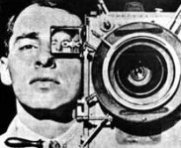Capturing the Ephemeral – Boris Kaufman & Dziga Vertov
Dziga Vertov was the man behind the camera. (To see previous post on quiz here.)
Dziga Vertov 
Kinok checklist of essentials for a Kino-Eye filmmaker:
1. rapid means of transport
2. highly sensitive film stock
3. light handheld film cameras
4. equally light lighting equipment
5. a crew of super-swift cinema reporters (etc) (From Senses of Cinema on Vertov.)
This man with the strange Russian name became familiar with most of us through Jean Luc Godard’s films or reading about Jean Luc Godard.
(Jean Luc Godard formed a group called “Dziga-Vertov Group” with Gorin in 1968 after the success of his film “Weekend” was released. This was the beginning of a period when Godard films became more didactic and unbearable”.)
Vertov, whose pseudonym translates as “whizzing top,” started his film career in news reels… more from here.
From propaganda to high art – Jonathan Jones on the Russian director who invented modern film called him Alien and Enigmatic.
I yam what I yam by Bryan Konefsky
“I am kino-eye, I am mechanical eye. I, a machine, show you the world as only I can see it.” Excerpt from Kino Eye manifesto, 10 April 1923 – Dziga Vertov
Boris Kaufman was responsible for this image.
On the Waterfront 
His brother Boris Kaufman was the cinematographer for L’atalante by Vigo, which answers the second question posed by the film quiz.
Films of Boris Kaufman include masterpieces such as Zero for Conduct, On the Waterfront, 12 Angry men, and Baby Doll.
“The poetic power of the film, however, had a lot to do with the cinematography of the Russian-born Boris Kaufman, who worked on each of Vigo’s films and was said to be the youngest brother of Dziga Vertov, and a collaborator with him on the famous Kino-Pravda films. Kaufman later went to Hollywood, where he helped make On The Waterfront, but he always recalled the days of working so closely with Vigo as “cinematic paradise”. The images he and Vigo created with l’Atalante were dreamlike but intense and entirely without sentiment. And the final shot of the barge, taken from on high, is an abiding triumph. Maurice Jaubert’s superb score was a perfect match (from here.)
Brother in documentary is a film about the two brothers most of us have not seen.
Boris Kaufman may not have the historical cachet that his brother has but more people have seen films captured by his camera.